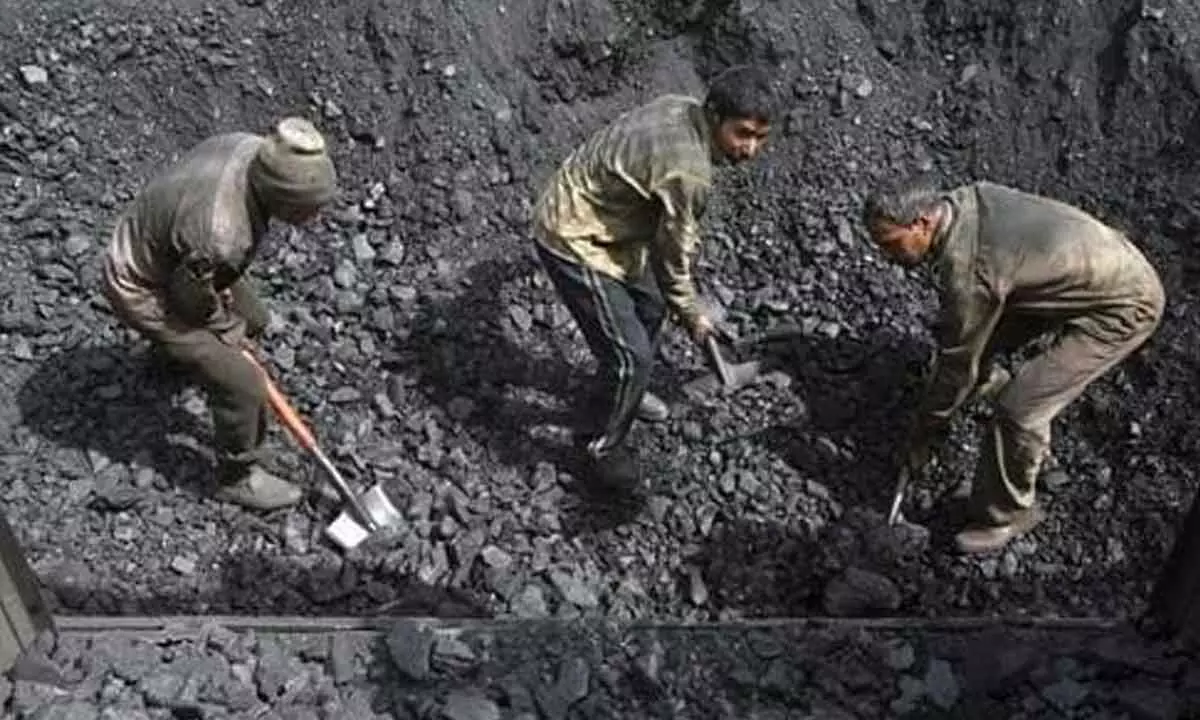Spike in coal output blurs Net Zero target

Coal continues to be king in feeding India's power plants and the country is leaving no stone unturned in stepping up production of the fossil fuel to meet the surging demand for electricity as it is crucial for accelerating economic growth.
New Delhi: Coal continues to be king in feeding India's power plants and the country is leaving no stone unturned in stepping up production of the fossil fuel to meet the surging demand for electricity as it is crucial for accelerating economic growth.
In the process, though, the Net Zero goal for carbon emissions by 2070, which is vital to fight pollution and climate change, is getting blurred.
The Coal Ministry released data on Friday that show India's coal production during October this year has surged by as much as 18.6 per cent to 78.65 million tonne (MT), compared to 66.32 MT in the same month last year. For the April-October period during the current financial year, there has been an 11.98 per cent jump in the country’s coal output to 541.73 MT from 483.78 MT during the same period in 2022-23.
"The notable surge in both coal production and dispatch underscores the nation's advancing energy self-sufficiency and reinforces our determination to meet forthcoming energy demands. The Ministry of Coal remains resolute in its commitment to ensuring continuous coal production and distribution, thereby securing a dependable energy supply that bolsters the nation's ongoing development," according to the Coal Ministry statement.
"By 2030, energy consumption is expected to double. We will need to add capacity so that our country can grow. Net Zero is important, but what is more important is that we ensure enough electricity for our growth. The living standards of our people will need to improve -- and that will require higher per capita consumption of electricity," R K Singh, the country’s Minister for Power and Renewable Energy, said while addressing a plenary session on "Renewables - Powering the Net Zero Agenda of India", at the CII Annual Session 2023 in May this year.
More recently on November 1, R K Singh also highlighted the fact that Net Zero will remain only a goal unless the world gets together to solve the problems of lack of diversification of solar manufacturing capacity and associated supply chains. Singh, who is also the ISA President, said that storage remains critical for greater utilisation and round-the-clock provision of renewable energy. "Storage is a problem, since the developed world kept talking about the need for energy transition but did not do anything about it. They did not add storage and did not make progress on existing technologies."
Singh lamented that sufficient manufacturing capacity was not added. Today, about 90 per cent of the solar manufacturing capacity is in one country, mostly dependent on one chemistry, i.e. lithium ion which raises supply chain challenges, he added.
"Beyond a point, unless we have storage, adding renewable becomes wasteful. If we add capacity, we will have a huge quantity of solar energy during mid-day which gets wasted if we don't have storage. As regards wind, when it is available, beyond a capacity, it will also get wasted unless we have storage," the Minister said. At the same time, he highlighted the country's plans to add 50 GW of renewable capacity each year, going to 500 GW renewable capacity by 2030.
"We have pledged in Glasgow that we will have 50 per cent of our established capacity coming from non-fossil fuels by 2030, we are confident that we will be able to achieve 65 per cent. We will also achieve way beyond our target of reducing our emission intensity by 45 per cent by 2030," Singh added.
However, energy experts are of the view that fossil fuels, mainly coal which is available in relative abundance, continue to make up 75 per cent of India's power supply and the picture will not change easily going ahead. As of now, the country's solar, wind and hydroenergy capabilities are still unreliable as they are dependent on the climate, they added.
The Power Minister has emphasised that the country has added 1.84 lakh MW of power from 2014 till now, but this is not sufficient. Our per capita carbon emissions are one-third of global average, and there is going to be no compromise in ensuring 24/7 electricity.














